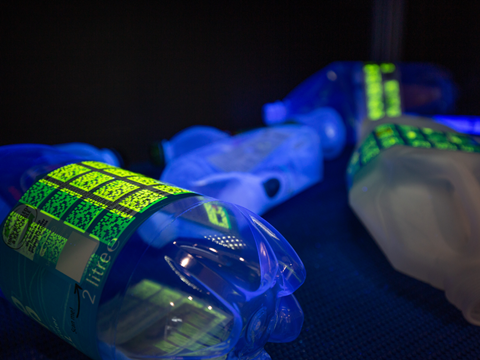
Polytag claims to have unlocked real-time traceability for 146,000 tonnes of plastic packaging waste by integrating Plastic Detection Units at its material recycling facilities (MRFs) in Wales.
With Plastic Detection Units, brands can scan invisible UV tags embedded in a pack’s label artwork and track where and when their plastic packaging has been recycled. Polytag and the Welsh company EBS have installed new units to help collect barcode-level data and track individual products as they enter the recycling stream.
The units are expected to offer brands data visibility on the 146,000 tonnes of waste thought to enter the recycling and recovery streams across its Conwy, Gwynedd, Pembrokeshire, and Anglesey sites every year. In general, they are set to boost recycling efficiency across participating MRFs, which are currently said to reach an average recycling rate of 66.5%.
Alongside Re-Gen’s MRF in Newry, Northern Ireland, and two Biffa facilities in Edmonton and Teesside, England, the four Welsh sites are part of Polytag’s Ecotrace Programme. This initiative is set to deploy Plastic Detection Units across material recovery facilities and help brands, retailers, and waste management businesses access real-time recycling data for their single-use plastics.
The project was funded by a £100,000 (€119,480) grant from the Small Business Research Initiative Centre for Excellence, funded by the Welsh Government; it is expected to further Wales’ broader strategy to achieve net zero by 2030.
“Wales is already a leader in recycling, currently holding the UK’s highest average recycling rate at a very impressive 66.5%,” explained Polytag CEO Alice Rackley. “Installing these four new Plastic Detection Units across the country takes this success even further.
“It will generate invaluable data on what is being recycled and when, empowering brands to take full responsibility for their recycled packaging while also striving to increase that number even more.
“As a Welsh owned business, it’s especially rewarding to see our technology embraced with open arms and to have the opportunity to build on its stellar credentials. We’re excited to see the results it yields in what we are confident will be a remarkable move towards a fully circular economy.”
“This initiative, made possible by the Circular Economy in the Public Sector SBRI Challenge, is a valuable step in improving recycling data in Wales,” added Kate Williams, innovation programme manager at SBRI Centre of Excellence. “Installing advanced tracking technology to promote a circular economy approach within our recycling streams is essential.
“We’re excited to witness the positive impact our collaboration with Polytag will have on collective sustainability targets and the potential it creates for improving recycling rates across the region.”
Last week, Closed Loop Partners published new data collected from AI-powered vision systems suggesting that high volumes of recycled food-grade polypropylene has been captured at MRFs – a finding that could create new opportunities to return the material to foodservice packaging supply chains, the study suggests.
In another project, Polytag is guiding Ocado Retail’s consumers through the refill and return process via Digital Link QR codes displayed on reusable packaging for over sixty food, drink, and household product ranges. When they scan the code with a smartphone, consumers are taken to a landing page providing information on the product, sourcing initiatives, recycling, food waste prevention, and more.
If you liked this story, you might also enjoy:
Reuse vs. single use – which is better for the environment?
Sustainable Innovation Report 2025: Current trends and future priorities
What can the world learn from South Korea’s world-leading performance in plastics circularity?














No comments yet